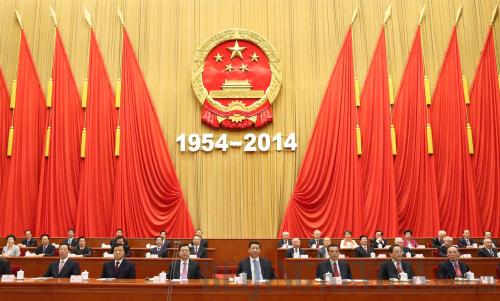

BIG CELEBRATION: China holds a conference on September 5 to celebrate the 60th anniversary of establishing the National People's Congress system (LIU WEIBING)
On September 5, China held a conference to celebrate the 60th anniversary of establishing its National People's Congress (NPC), the country's top legislature. President Xi Jinping addressed attendees of the event. While reiterating the role of the people's congress as China's fundamental political system, he called on the whole nation to continue to hold high the banner of democracy.
"In new situations, we should adhere to and further improve the system of the people's congress as required by the times," he said.
China's people's congress system was established in 1954. On September 15 that year, the First NPC convened its First Plenary Session, declaring the official formation of the system. After 60 years of development, the system has evolved into a mature legislative mechanism, governing the country's socialist democracy.
A legal framework
According to China's current Constitution, the NPC and its Standing Committee exercise the legislative power of the state. The people's congress has played a significant role in uniting China under the rule of law.
In 2011, Wu Bangguo, then Chairman of the NPC Standing Committee, declared that a comprehensive socialist system of law with Chinese characteristics had been established in China as of 2010. Under the system, the Constitution is the most fundamental law of the country.
In the initial years of the People's Republic of China (PRC), the Common Program of the Chinese People's Political Consultative Conference (CPPCC), adopted by the First Plenary Session of the First CPPCC in September 1949, served as a temporary constitution for the country.
In September 1954, right after the People's Congress was established in China through election, the First Session of the First NPC adopted the PRC's first Constitution. It established democracy, basic socialist principles, the Party's general political line in the country's transitional period, as well as the state system and the basic rights and obligations of citizens.
In the following years, the NPC and its Standing Committee formulated a series of laws and regulations, such as the Marriage Law, Trade Union Law and the Electoral Law, all of which ensured the smooth operation of the state and society.
However, during the two decades from 1957 when the country launched the "anti-rightist movement" through the "cultural revolution" (1966-76), China's drafting of legislation slowed down, even halting for periods of time. In 1975, China enacted its second Constitution during the First Session of the Fourth NPC. In 1978, the Third Plenary Session of the 11th Central Committee of the Communist Party of China opened the door again for the development of the country's legal system.
In 1979, seven laws including the Criminal Law, Criminal Procedure Law, Organic Law of the Local People's Congresses and Local People's Governments of the PRC, Electoral Law for the National People's Congress and Local People's Congresses, Organic Law of the People's Courts, Organic Law of the People's Procuratorates, and Law on Chinese-Foreign Equity Joint Ventures were passed at the Second Session of the Fifth NPC. Since then, laws and regulations have been passed at every NPC session and plenary meeting of its Standing Committee.
In 1978, China had its third Constitution, which, however, soon proved inconsistent with social changes in the country after the implementation of the reform and opening-up policy.
In 1980, the NPC set up a Constitutional Amendment Committee, starting the amendment work to the Constitution. In April 1982, a draft of the new Constitution was released for a four-month-long nationwide debate, which eventually involved nearly 80 percent of Chinese citizens and resulted in around 100 changes.
In December 1982, the Fifth Session of the Fifth NPC passed the revised Constitution, popularly known as the 1982 Constitution.
"In the 1982 Constitution, the chapter on the fundamental rights and duties of citizens is put ahead of the chapter on the structure of the state," said Han Dayuan, President of the Constitutional Law Institute of the China Law Society and Dean of the Law School of Beijing-based Renmin University of China.
Copyright ©1999-2018
Chinanews.com. All rights reserved.
Reproduction in whole or in part without permission is prohibited.